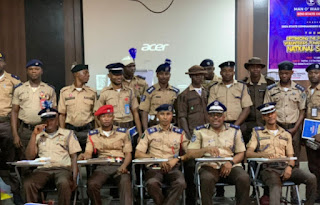As the World celebrates International Women's Day, Stakeholders Advocate for Women and Girl’s Empowerment
From Communications Development (DEVCOM), Lagos
March 8, 2017
The overall development of a country depends upon the maximum utilization of her people, both men and women. In Nigeria, women comprise nearly half of the total population and are identified with domestic life while politics is seen as a male-dominated public activity that is typically masculine in nature. The theme of this year’s International Women’s Day campaignBEBOLDFORCHANGE is a call to the masses and the women to help forge a better working world - a more gender inclusive world.
Despite the advancement in time, the status of Nigerian women is much lower than that of men especially in the Northern part of the country. Situation analysis shows that women and children are marginalised and denied the opportunities to develop to their full potential in lending their hands in development. Gender concerns militate against the extension of equal opportunities to children and women and therefore, lead to frustration, apathy, violence and lop-sided development and underdevelopment (FGN and UNICEF, 2001).
Gender based violence is prevalent in many parts of Nigeria and is deep-rooted in cultural beliefs. Common forms of violence against women in Nigeria are rape, acid attacks, molestation, and wife beating. It is of greatest concern in pregnancy because of its effect on the woman and the unborn baby; it is known to be associated with adverse pregnancy outcome such as miscarriage, preterm delivery, low birth weight and perinatal death. According to 2013 National Demographic and Health Survey (NDHS), 28% of women age 15-49 have experienced physical violence at least once and 7% experienced sexual violence at least once in their lifetime.
It is however regrettable that the bill seeking to enthrone gender equality by combating discrimination against women at all levels and also promote girls’ access to education, freedom for women to participate in any economic activity and their right to freedom, sexual abuse, and violence in public and domestic spaces has not been passed into law.
Women face discrimination in educational institutions, home front, taking up political appointments and most especially in working place. It has now become so rooted and practised as a social norm that changing the system will be a big challenge. Some of the factors identified as hindering women development often include lack of education/incomplete education, psychological factor, religion and cultural factors.
Executive Secretary, Youth Empowerment Foundation, Mrs Iwalola Akin-Jimoh noted that women are charged with heavy duties of caring for the husband, running the day-to-day affairs of her home, outside the fact that a 21st century woman seeks to get educated and desires to build her career.
She advocated for workplaces to provide mothers the opportunity to breastfeed their new‐born children.
“Sometimes, due to demanding careers, women are not able to spend time with their children. But some workplaces now offer mothers the opportunity to take care of their children while at work instead of relieving the mothers of their duties.”
She emphasized the importance of mothers’ breastfeeding their children, as this is the best source of immunity for the child.
On tackling gender-based violence Iwalola asserted that ‘’this requires a combination of efforts at community level, working with school systems and the media, encouraging victims to report and the prosecution of perpetrators, and also the need to address the issue of stigma. It is important to ensure GBV survivors, especially women and girls, have access to safe and secure wide range of health and social support services that can address their needs.
Iwalola called on the government at all levels to ensure the protection and empowerment of women.
‘’Women, especially the girl-child must be given priority for their protection, promotion and empowerment. It is important to create safe spaces for girls to discuss important issues such as abuse, as this has brought to fore increased reporting of physical and sexual abuse of girls and women. Safe spaces need to be created in schools, communities and faith-based institutions to ensure that we address the safety needs of children and women’’.
Also, Toyin Saraki, Founder-President of Wellbeing Foundation Africa, in her statement reiterated “An empowered woman is a productive woman, a health seeking woman, therefore a woman can be entrusted with the survival and wellbeing of herself and her family.” In order to tackle the challenges of gender disparity, Nigerian government should increase women’s presence at the labour market by enabling them have better access to employment both in the formal and informal sector, make girl child education compulsory, encourage more women in leadership positions and take up political appointment.
International women’s Day (IWD) is celebrated on March 8th every year. It is a global day celebrating the social, economic, cultural and political achievements of women. Devcoms joins the rest of the world to commemorate this day as the health and wellbeing of a woman is vital to the wellbeing of a nation.



Comments